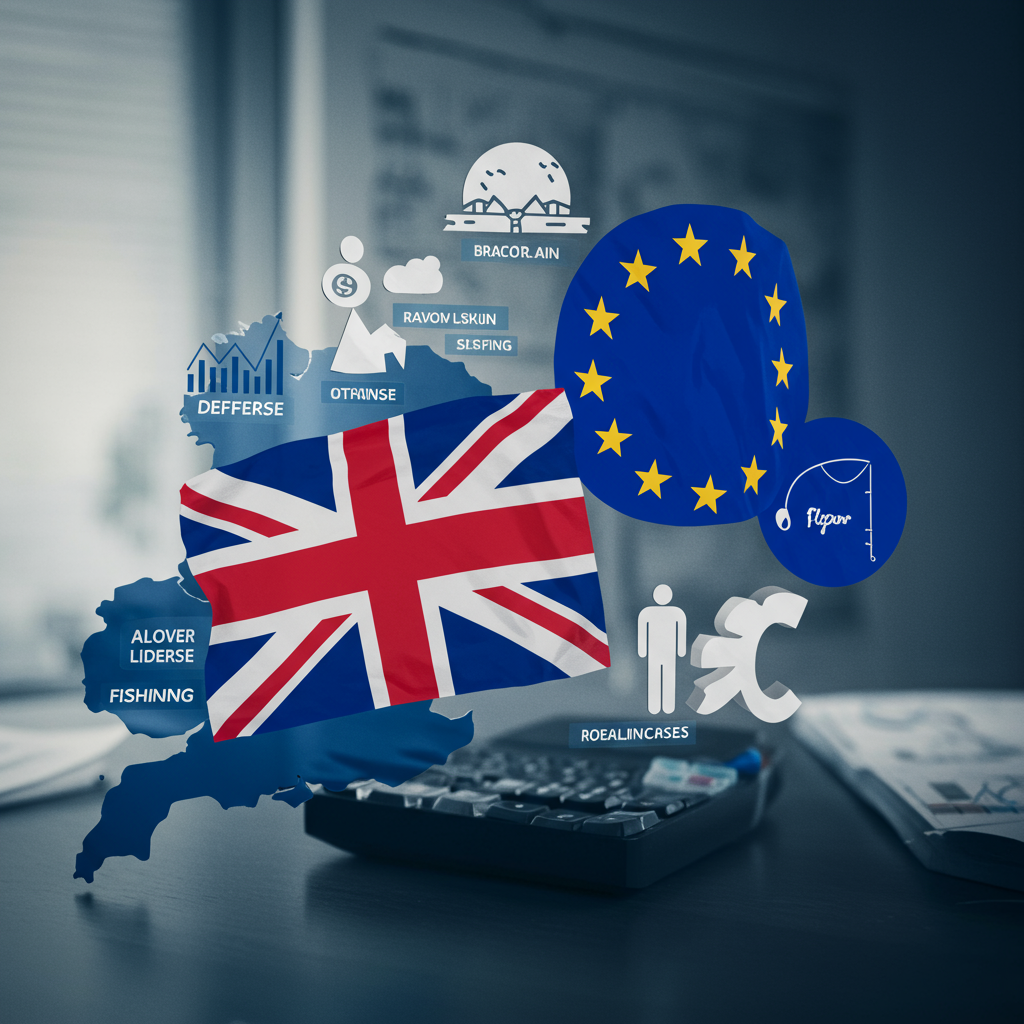A new agreement aimed at resetting the relationship between the UK and the European Union post-Brexit has been reached following a summit in London. This deal addresses several key areas, including trade, defence, fishing rights, and the movement of people, sparking considerable debate over its potential impacts.
Experts have analysed the complex terms of the agreement to identify the sectors and groups likely to benefit, as well as those who may find themselves at a disadvantage. Understanding these outcomes is crucial for grasping the evolving dynamics between the UK and its largest trading partner.
Here’s a breakdown of the potential winners and losers emerging from the new UK-EU ‘reset’ deal:
Trade in Food and Agricultural Products
One of the most significant areas impacted by Brexit has been the trade in food and agricultural goods between the UK and the EU. Since leaving the bloc, UK exporters have faced increased bureaucracy, new checks, and even bans on certain products, such as raw burgers and sausages, which no longer meet EU import rules. This added red tape is partly blamed for a notable decline in UK food export volumes to the EU, with figures in 2024 reportedly down 34% compared to 2019. Despite this, food and drink exports to the EU remained substantial in 2023, valued at £14bn and accounting for 57% of the sector’s total overseas sales.
The new agreement seeks to alleviate these burdens through a proposed joint food safety (Sanitary and Phytosanitary – SPS) agreement. If fully implemented, this could dramatically reduce paperwork, ease border checks, and potentially lift bans on previously restricted items like raw meats, allowing UK products back onto EU shelves more easily.
Potential Winners: UK food exporters stand to gain significantly from reduced trade barriers, potentially boosting sales and streamlining logistics.
Potential Losers: Those ideologically opposed to the UK aligning with EU regulations may view the conditions attached as a concession. The deal requires the UK to follow future EU food standards – a form of “dynamic alignment” – and accept the European Court of Justice’s final say in disputes within this specific area. An unspecified financial contribution from the UK is also expected.
Fishing Rights and Access
Fishing, while a small contributor to the UK’s overall economy (around 0.04% of GDP), remains a highly politically sensitive issue. The existing post-Brexit fishing arrangement, which allows EU vessels access to UK waters in exchange for transferring 25% of their quotas to UK fleets, was due to expire in 2026.
The new agreement includes a provision for “full reciprocal access” for fishing vessels that is set to continue until 30 June 2038. This 12-year extension is much longer than many expected and maintains the current status quo regarding access, while the UK will continue to agree yearly quotas with the EU (and Norway) and manage access via licences.
Potential Winners: The EU, whose fishing fleets secure over a decade of continued access to UK waters, providing long-term certainty.
Potential Losers: Some UK fishermen and industry groups, such as the Scottish Fishermen’s Federation, who have strongly criticised the extension. They argue it’s worse than the previous deal and removes their desired annual bargaining power over access arrangements. Conversely, Prime Minister Starmer claims the deal eases export processes for UK fishermen, who exported £1.2bn of fish to the EU in 2023 (70% of total exports). Salmon Scotland welcomed potential reduced checks for speeding up deliveries. The government has also announced a £360m fund to support the sector.
Youth Mobility and Exchange
The agreement includes the concept of a “youth experience scheme” or “youth mobility scheme,” though details require further negotiation. The aspiration is to enable young people (potentially aged 18-30 or 18-35, mirroring existing UK schemes with countries like Australia and New Zealand that allow work/travel for up to three years) from both the UK and EU to work and study more freely across borders. The UK is also reportedly negotiating to rejoin the Erasmus+ programme.
Potential Winners: Young people in both the UK and the EU who could see opportunities for working, studying, and travelling abroad made easier compared to current post-Brexit restrictions.
Potential Losers: Those concerned about potential increases in UK net migration figures. Historically, more young people from the EU came to the UK than vice versa. While experts suggest the long-term impact on overall migration might be minimal if schemes are temporary and participants return home, there could be short-term increases as people arrive. The scheme’s structure, potentially involving quotas, could influence this impact, especially given political commitments to reduce migration levels.
Easier Travel and eGates
Since Brexit ended free movement, UK travellers have often faced longer queues at EU border controls and have typically been unable to use the faster eGates available to EU citizens. The new agreement addresses this, referencing the “potential use of eGates where appropriate” for British nationals at EU airports.
While the UK government has suggested this will end “dreaded queues,” the reality is more nuanced. Travel organisations indicate that the deal clarifies that EU countries can offer eGate access to UK nationals after the EU’s new digital Entry/Exit System (EES) is rolled out, expected in October. Implementation by the summer travel season is unlikely, and ultimately, whether UK passengers can fully bypass border guards will depend on the technology and decision of each individual EU country. A new system is also planned to simplify pet travel.
Potential Winners: British tourists who may, in the future, gain access to eGates at some EU airports, potentially reducing waiting times.
Potential Losers: Holidaymakers hoping for immediate relief from queues, particularly during the upcoming summer, as changes are not expected soon and universal access is not guaranteed.
Defence and Security Cooperation
A formal defence and security pact has been established, involving regular meetings between officials to coordinate on foreign policy, sanctions, and information sharing, including developing a joint approach to space-related security. A concrete outcome is the UK’s decision to join the EU’s PESCO project focused on military mobility.
Furthermore, the agreement could provide UK defence firms with access to the EU’s new €150bn (£150bn is also cited) Security Action for Europe (SAFE) fund. This fund, designed to help EU member states rearm, was primarily intended for EU-based companies. Opening it up could allow EU nations to use SAFE funds to purchase equipment from UK defence manufacturers, who contribute significantly to the UK economy, employing around 164,000 people, and making the UK the seventh-largest global arms exporter between 2020-2024.
Potential Winners: UK defence firms could gain access to substantial new contract opportunities from the EU’s rearmament fund.
Potential Losers: EU defence firms who might face increased competition for revenues from the SAFE fund. Details on the extent and timing of UK participation are still being finalised.
Carbon Markets and Energy
The agreement also addresses economic areas like energy and carbon markets. The UK and EU have agreed to link their carbon markets.
Potential Winners: Industries trading between the UK and EU, particularly carbon-intensive sectors like steel and cement. Linking markets is intended to prevent the imposition of carbon border taxes, potentially saving British businesses an estimated £800m and specifically protecting the UK steel sector from EU tariffs (citing a £25m annual benefit from a UK-only deal framework). Discussions are also planned for potential UK participation in the EU’s shared electricity market, though this would necessitate adhering to EU rules.
Potential Losers: This area appears to have fewer immediate, direct “losers” identified within the context of this specific agreement, though adherence to EU rules for electricity market access might be viewed negatively by those favouring full regulatory divergence.
Overall Impact
As with many complex international agreements, the new UK-EU deal presents a mixed bag of outcomes. It seeks to ease some of the frictions that have emerged since Brexit, offering potential benefits to exporters, young people, and travellers in specific areas. However, these gains often come with conditions, such as alignment with EU standards or acceptance of oversight mechanisms, which may be contentious for those prioritising complete regulatory divergence.
The extended fishing access has been a particular point of friction for some in the UK industry, while benefits like eGate access for travellers are contingent on future technical implementation and individual EU country decisions. Access to the EU’s defence fund represents a potential boost for UK industry but is still subject to detailed negotiation.
Ultimately, this “reset” agreement represents a series of trade-offs and compromises. The full extent of its impact, and who definitively emerges as a winner or loser, will become clearer as the specific mechanisms are implemented and tested over time.
References
- https://www.bbc.com/news/articles/cz63d82z785o
- https://www.bbc.co.uk/news/articles/cz63d82z785o
- https://www.bbc.com/news/articles/czdy3r6q9mgo
- https://unctad.org/news/no-deal-brexit-trade-winners-and-losers
- https://blogs.sussex.ac.uk/uktpo/publications/winners-and-losers-from-international-trade-what-do-we-know-and-what-are-the-implications-for-policy/



